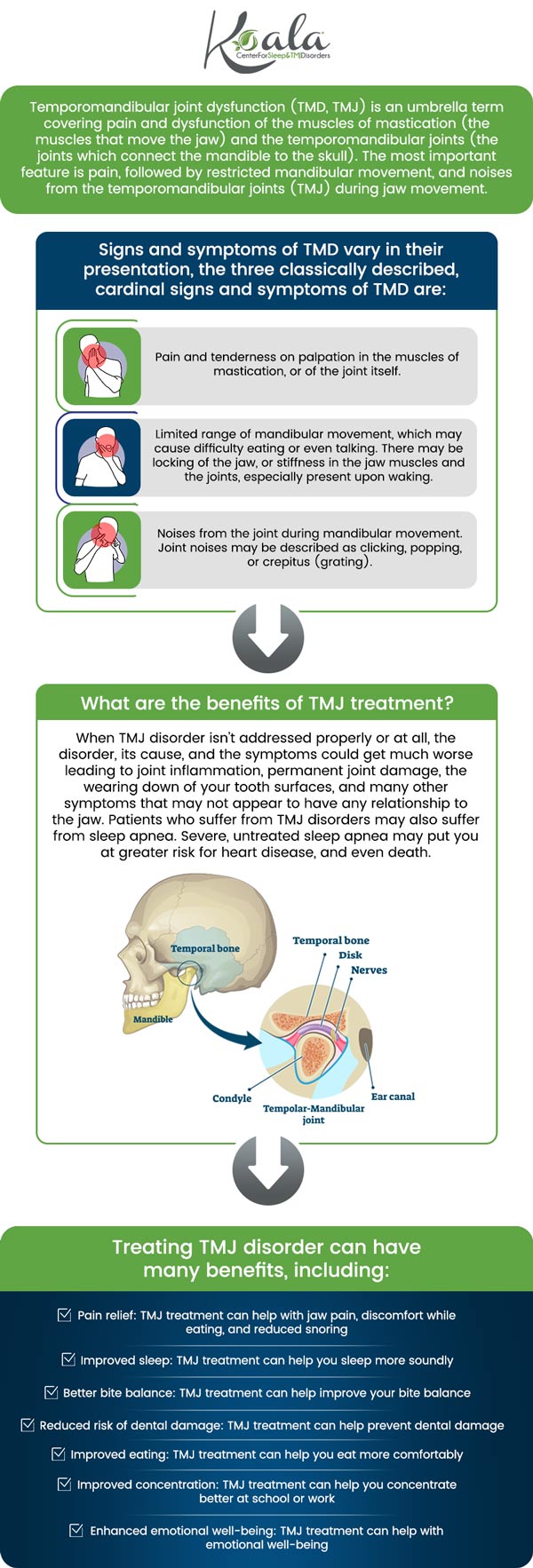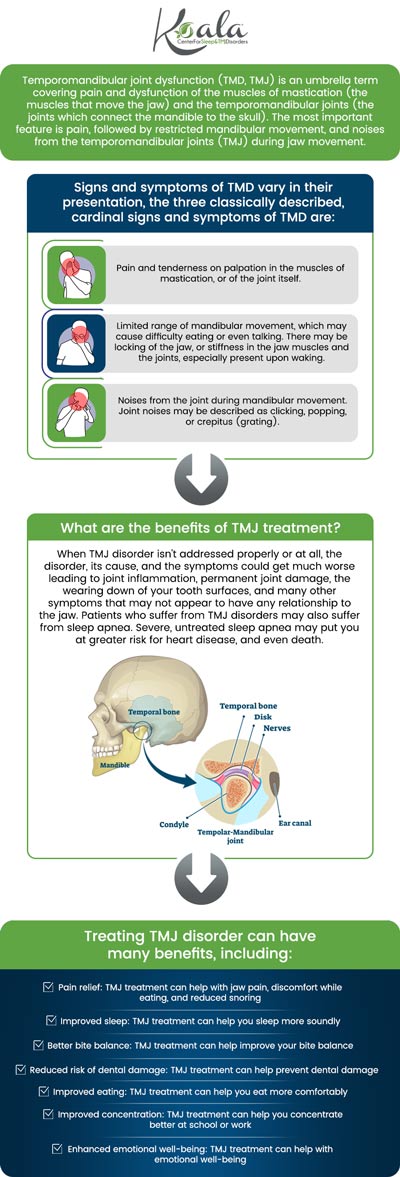When Is Surgery Necessary for TMJ Disorders?
At the Koala® Center for Sleep & TMJ Disorders, our team understands that TMJ surgery is a significant decision. We believe that non-surgical treatments are the first and most effective solutions for the vast majority of our patients. For those who do not find relief through more conservative methods, we provide a thorough evaluation to determine if surgery is a necessary next step. For more information, please contact us today or request an appointment online. We have convenient locations in Bloomington IL, Peoria/Dunlap IL, El Paso TX, and Wausau WI.


Table of Contents:
When is TMJ surgery considered a necessary treatment option?
What specific symptoms or diagnostic findings would lead a doctor to recommend surgery over other treatments?
What is the average recovery time and downtime after TMJ surgery?
What are the potential risks and complications associated with TMJ surgery?
At Koala Center For Sleep & TMJ Disorders, our team is dedicated to helping patients find relief from TMJ (temporomandibular joint) disorders using the most conservative and effective treatments available. In most cases, individuals experiencing TMJ symptoms benefit greatly from non-surgical approaches, such as custom dental splints, lifestyle modifications, physical therapy, and appropriate medications. Our holistic and minimally invasive treatment philosophy means that surgery is rarely needed.
TMJ surgery is considered only when all other conservative therapies have been exhausted and the patient continues to experience severe pain, jaw dysfunction, or significant limitations in daily life. Surgical intervention may be necessary in rare situations—such as severe joint degeneration from arthritis, major structural abnormalities, persistent dislocation or locked jaw, or traumatic injury causing joint damage.
Our team is dedicated to providing the most effective and least invasive treatment options for sleep disorders and temporomandibular joint (TMJ) disorders. While most patients benefit from conservative therapies such as oral appliance therapy, lifestyle modifications, physical therapy, or medications, there are situations where surgery may be considered.
Surgery is typically reserved for cases where non-surgical treatments have not provided adequate relief, or when the condition significantly impacts a patient’s quality of life or overall health. For instance, if a patient with obstructive sleep apnea (OSA) does not respond to oral appliances, CPAP therapy, or positional therapy, and continues to experience severe symptoms such as excessive daytime sleepiness, loud snoring, or episodes of stopped breathing, surgical intervention may be explored. Common surgical procedures for sleep apnea might involve removing or repositioning tissues in the throat or jaw to improve airflow.
Similarly, for patients suffering from TMJ disorders, most experience improvement with conservative management. However, if there is persistent, severe jaw pain, dysfunction, or locking that does not improve with oral appliances, physical therapy, or medications, and imaging studies reveal significant joint damage or structural abnormalities, surgical options such as arthroscopy or joint repair may be considered.
Other Indications for Surgery
Other factors that might lead to surgical recommendations include:
● Progressive neurological symptoms related to TMJ disorders, such as facial numbness or weakness.
● Evidence of infection or abscess in the jaw area not responding to antibiotics.
● Structural abnormalities contributing to OSA, such as enlarged tonsils, deviated septum, or jaw misalignment, cannot be addressed non-surgically.
● Persistent symptoms that severely impact daily activities, work, or overall well-being, despite ongoing conservative care.
At the Koala, we understand that recovery from TMJ (temporomandibular joint) surgery is an important concern for our patients. Recovery time can vary depending on the specific type and extent of the procedure performed. For minimally invasive TMJ surgeries, such as arthrocentesis or arthroscopy, most patients are able to return to their normal daily routines within one to two weeks, although some mild discomfort or swelling may continue for a few weeks. More extensive open-joint TMJ surgeries may require a longer recovery period, typically between three to six weeks before resuming regular activities, and full healing can take up to three months.
During the initial recovery period, our team will provide you with comprehensive post-surgical care instructions, which may include following a soft or liquid diet, avoiding strenuous activities, and managing swelling or jaw stiffness. These symptoms are common and generally improve over time. We may also recommend a personalized physical therapy plan to help you regain optimal jaw function.
Regular follow-up appointments at the Koala Center For Sleep & TMJ Disorders are essential to monitor your healing, address any concerns, and ensure a smooth recovery. Our experienced team is dedicated to supporting you every step of the way and helping you return to comfortable, pain-free jaw movement as quickly and safely as possible.
We prioritize your health, comfort, and long-term well-being through comprehensive evaluation and customized treatment plans for TMJ disorders. While TMJ surgery can be an option for some patients with severe or persistent symptoms, it is important to understand the potential risks and complications involved.
Potential Risks of TMJ Surgery: TMJ surgery, like any surgical procedure, carries certain inherent risks. These may include:
● Infection: Surgical sites can become infected, occasionally requiring antibiotics or additional procedures.
● Bleeding and Swelling: While often temporary, excessive bleeding or swelling may impede healing or necessitate further care.
● Nerve Injury: Because the TMJ is situated near key facial nerves, surgery can sometimes result in numbness, tingling, or persistent pain, which in rare instances may be long-lasting.
● Scarring: Open joint surgeries can leave scars, which may be noticeable or thickened in some patients.
● Limited Jaw Movement: Post-surgical stiffness or limited mobility can occur, sometimes requiring physical therapy to restore full function.
● Malocclusion: Changes in your bite (how your teeth fit together) may develop after surgery, potentially needing further dental or orthodontic work.
If you are experiencing TMJ pain or dysfunction, please contact Koala Center For Sleep & TMJ Disorders to schedule a thorough evaluation. Together, we can determine the safest and most effective approach to restoring your jaw function and improving your quality of life. Call us today to schedule your consultation with our providers.

Additional Services You May Need
▸ KoalaKIDZzz®
▸ Sleep Apnea
▸ Snoring
▸ TMJ Disorder
▸ Fatigue
▸ Sleep Disorders
▸ Weight Loss
▸ CPAP Alternative
▸ Oral Appliances




